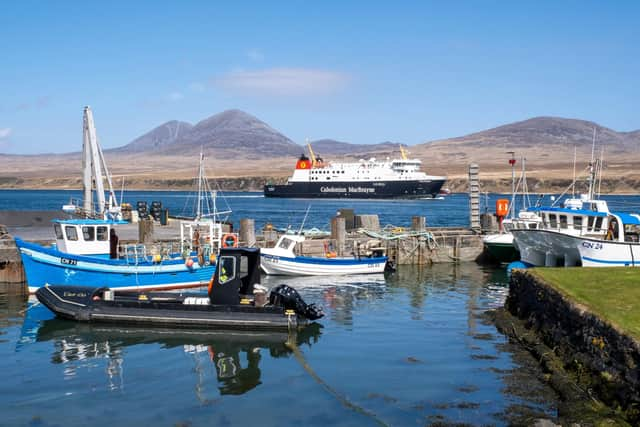CalMac may be forced to cut sailings to keep its ageing fleet operating
Managing director Robbie Drummond has told Scotland on Sunday the west coast operator could have to reduce its winter timetable and/or delay increased summer sailings next year because of the scale of the work needed.
It follows a series of breakdowns and short-notice suspensions this year when vessels were taken taken out of service for urgent repairs.
Advertisement
Hide AdAdvertisement
Hide AdIn a stark warning to passengers, Drummond said: "The position is not going to improve – it’s going to get worse because the [average] age of the vessels is going to increase over the next one to two years before we see the new ones coming through."


He said the problem was the CalMac fleet was being worked so hard with no mid-life upgrades.
Drummond said: "You cannot operate a fleet of ageing vessels 100 per cent of the time – it’s just not tenable.
"The pressure on the winter dry dock is ever increasing, which means: are we able to continue to run the timetable set by Transport Scotland, because we are just going to have to spend more time investing in the vessels."
Drummond said winter sailings may have to be reduced to accommodate the mounting workload.


He said: "It’s not the overhauls that are the problem, it’s the upgrades and the system replacements.
"Over five years, our spend on overhauls, running repairs and upgrades has gone up by 70 per cent from £21m to £34m, but it’s not just the cost of that that’s placing massive pressure on CalMac, it’s the time and ability to get that work done that’s the biggest challenge.
"The pressures and spend is only going to increase in the next two years.
Advertisement
Hide AdAdvertisement
Hide Ad"We are going to have to look at potentially reducing services or maybe impacting the start of the summer timetable.
“Everything is at maximum stretch, and then you throw after that our vessels are now aged 23 years on average and a third of the fleet is past its lifetime estimate.
"What most fleets do is a major upgrade at between 15 and 20 years, costing £5-10 million, which gives you a genuine life extension.
"That makes financial sense, but it’s [been] done on none of the CalMac fleet."
Drummond said major work ahead included on the Islay ferry Finlaggan, which is nearly 12 years old and facing “issues of obsolescence” because components had become more complex.
He said: "Over the next few years, systems will have to start being replaced, which is as expected, but what you have to do is plan time into the way you operate so you can allow that, and that requires you not to operate your fleet at maximum stretch.
“The decisions three or four years ago to operate all the vessels and sailings were done for the best of reasons, but that’s now producing a real challenge.”
That followed major fare reductions under the Scottish Government's “road equivalent tariff” (RET) scheme, which had significantly increased traffic.
Advertisement
Hide AdAdvertisement
Hide AdScottish Labour islands spokesperson Rhoda Grant said: “This is a damning indictment of the SNP’s record of failure on ferries from someone with unrivalled experience of it.
“The SNP’s mismanagement has been hammering Scotland’s lifeline ferry services for years, leaving us with decades-old ships, constant breakdowns, and lack of capacity.
“Islanders are being cut off from services and loved ones, while local economies lose millions.
“The SNP must listen to these stark warnings and finally start delivering the strategic approach to shipbuilding and purchase we desperately need.”
Scottish Conservatives transport spokesperson Graham Simpson said: “These comments lay bare the problems caused by years of under investment and indecision by the SNP.
“As the ferry fleet gets older the repair bills mount and the delays soar.
“You don't have to be a marine engineer to see what needs to be done – we need a proper ferry replacement programme and the pace of bringing in new vessels must be ramped up.
“None of is this is CalMac's fault. They can only work with the ferries they are given.”
Advertisement
Hide AdAdvertisement
Hide AdScottish Government firm Caledonian Maritime Assets Limited (Cmal), which owns and buys CalMac’s ferries, said ministers had not provided the required funding.
Chief executive Kevin Hobbs said: “CalMac is right to point out the fleet is working harder than ever, fuelled by the introduction of RET.
"We must also recognise the capital funding hasn’t been there to do what Cmal has recommended in terms of vessel replacement and harbour upgrades.
"However, the Scottish Government’s funding of £580m over five years to 2026 will go some way towards addressing what’s needed.
"That has allowed us to accelerate a replacement programme, and several new vessels and harbour redevelopment projects are now underway.
"It is our professional assessment that a total of £1.4 billion is required over a ten-year period to reduce the average age to under 15 years."
A Transport Scotland spokesperson said: “The Scottish Government has established a resilience fund to ensure future reliability and availability of vessels, which is over and above the annual expenditure for maintenance and repairs.
"The allocation for 2021-22 is £4m for each of the lifeline fleets.
Advertisement
Hide AdAdvertisement
Hide Ad"Cmal is responsible for governance of this funding with CalMac leading on implementation.
"Since 2007 we have also increased frequency significantly on a number of services as well as bringing in new routes.
“We have long acknowledged the need to address delays in ferry infrastructure, which is why we have committed to investing a further £580m in the Infrastructure Investment Plan.
"We have recently issued the contract to build two new ferries for the Islay routes and the recently-acquired Loch Frisa has entered service [on the main Mull route in June].
“We continue to charge CalMac and Cmal with seeking potential second-hand tonnage [vessels] to improve operational resilience.”
Comments
Want to join the conversation? Please or to comment on this article.
